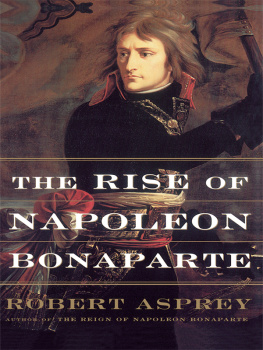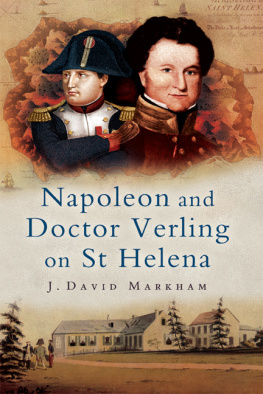
NAPOLEON
FROM THE TUILERIES TO ST. HELENA
PERSONAL RECOLLECTIONS OF THE EMPEROR'S SECOND MAMELUKE AND VALET
LOUIS ETIENNE ST. DENIS (Known as Ali)
Translation from the French and Notes by Frank Hunter Potter.
With an Introduction by Professor G. Michaut, of the Sorbonne
WITH MAPS
This edition is published by PICKLE PARTNERS PUBLISHING
Text originally published in 1911 under the same title.
Pickle Partners Publishing 2011, all rights reserved. No part of this publication may be reproduced, stored in a retrieval system or transmitted by any means, electrical, mechanical or otherwise without the written permission of the copyright holder.
Publishers Note
Although in most cases we have retained the Authors original spelling and grammar to authentically reproduce the work of the Author and the original intent of such material, some additional notes and clarifications have been added for the modern readers benefit.
INTRODUCTION
LOUIS TIENNE SAINT-DENIS was born at Versailles on September 22, 1788. His father, Etienne, had been piqueur {1} in the royal stables under Louis XVI. The connoisseurs of the noble art of equitation have spoken of him with lively admiration. He was, it seems, a "model of a fine position on a horse," and above all he struggled energetically for the French traditions against the "antinational" school of the Anglomaniac horsemen. He had married Marie Louise Notte, daughter of an officer of the royal kitchens. One of his great-granddaughters still recollects hearing Aunt Notte, an unmarried sister of Marie Louise Notte, tell proudly how her father had made a cage of nougat which had been placed on the table at one of the court ftes. There was a bird shut up in it, which flew away when it was broken and in its flight perched on the head of Marie Antoinette. The Revolution cost Etienne Saint-Denis his place. He moved to Paris, where for more than fifty years (he died in 1843, at the age of eighty-nine years) he was a riding master. At seventy-six he still broke horses, preferably those which his enemies, the so-called innovators, had failed in training and had made unruly.
After good preliminary studies, to which the writing and spelling of all his papers bear witness, Louis Etienne Saint-Denis became a clerk in the office of the notary Colin, in the Place Vendme, in 1802. He remained there four years. At the end of that time, taking advantage of former relations with the Duke of Vicenza, {2} the elder Saint-Denis secured his son's admission to the Emperor's household. The youth first spent a month in the business offices of the stable, no doubt as a supernumerary or probationer, then on May 1, 1806, he was placed definitively on the registers with the title of student piqueur. He became underpiqueur in 1808, and then, having been appointed Mameluke and decorated with the name of Ali, he became "assistant arquebus carrier" on January 1, 1812.
Indeed, he himself drew up the account of his services.
SERVICES
OF LOUIS TIENNE SAINT-DENIS
ATTACHED TO THE HOUSEHOLD OF H. M. THE EMPEROR
NAPOLEON I
In May, 1806, he entered His Majesty's household as student piqueur in the apartment of carriage horses.
In March, 1808, he went to Bayonne and Spain.
In August he started for Erfurth. When he returned to Paris he was appointed underpiqueur and shortly afterward he was seat to Bayonne and Spain. He returned to France with the detachments which had remained at Valladolid.
In April, 1809, he started for Germany with a convoy of horses. He returned to France with his convoy. On his arrival in Paris he took a large number of draught horses to Bayonne and then to Spain.
In September, 1811, he made the journey to Holland and commanded the third service in the Emperor's suite.
In December he entered the personal service of the Emperor in the private apartments as second Mameluke and accompanied His Majesty during the campaign in Russia.
In 1813, during the first part of the campaign of that year, he remained on detached service at Mayence and then went to join the Emperor at Neumark. In the second part of the campaign he accompanied His Majesty. After the passage of the Rhine he remained at Mayence and left that city only after the foreign armies had entered Paris.
When he returned to Paris he went to Elba to join the Emperor.
In 1815 he was on board the Inconstant. He was on duty with the Emperor the day he entered Grenoble. He was also on duty with His Majesty when he arrived at Fontainebleau, and during all the journey from Fontainebleau to Paris.
In June he was always with the Emperor during the short campaign in Belgium, at the battle of Ligny and at that of Waterloo. He had left the lyse with His Majesty and he returned to that palace with him.
He accompanied the Emperor from Malmaison to Rochefort. At the Isle d'Aix His Majesty chose him to go to America when he intended to embark on a lugger.
On May 5, 1821, he was at Longwood.
It was he who made clean copies of the Emperor's dictation. All the Memoirs of St. Helena, with slight exceptions, are in his hand.
His protector was the Duke of Vicenza.
Further, Saint-Denis forgets, in this curriculum vit (I do not know why), the title of which he was so proud, that of the Emperor's librarian.
Saint-Denis had married Mary Hall at St. Helena on October 18, 1819. She was a young English Catholic, born in Birmingham on December 5, 1786, who was governess to Grand-Marshal Bertrand's children. There was born to him on July 31, 1820, a daughter, Clmence, whose godfather and godmother were General de Montholon and Countess Bertrand.
After the Emperor's death the Saint-Denis family left the island. It embarked on the Camel on May 1821, landed at Portsmouth on July 21st, and arrived in Paris on August 28th.
Saint-Denis had but little fortune and the legacy which the Emperor had left him was not paid at once. He placed his wife and children temporarily at Versailles, with Grandmother Notte, and he himself lived with his parents, 34 rue du Dragon. He had found employment. "I leave the house at five in the morning," he wrote to his wife, on May 28, 1822, "and I rarely get back to it before eight o'clock at night. The fact that I have occupation makes me feel more strongly the desire to have you with me. Still, we must both be reasonable. This state of affairs cannot last long. What I earn is but little, it is true, but it is a beginning. My pay will be greater as the number of pupils increases. This small sum (thirty sous a day) will pay for my lodging, which is something, and ultimately I can be head of the establishment if it succeeds, which is probable enough." A few months later he was annoyed at not being able to find lodgings in the quarter near the Luxembourg. However, he was able to find a place to live in Paris, since his second daughter, Isabelle, was born there on June 11, 1826. Finally, whether the "establishment" did not prosper or whether Saint-Denis had left it, he decided to settle in the provinces, in order to live more economically. We do not know why he chose the town of Sens. Perhaps he was drawn there by a friend, a retired officer, Dufeu, who later made him his residuary legatee. Perhaps he wished to be near Marchand, his companion at St. Helena, who had settled not far away on his property Le Verger, in the commune of Perrigny, just outside of Auxerre.






![Louis de Montfort - The Saint Louis de Montfort Collection [7 Books]](/uploads/posts/book/265822/thumbs/louis-de-montfort-the-saint-louis-de-montfort.jpg)



